Monday Feb 23, 2026
Monday Feb 23, 2026
Saturday, 12 October 2024 00:00 - - {{hitsCtrl.values.hits}}
 Sandal and Thushari in their Nuwara Eliya restaurant 'The Walanda'
Sandal and Thushari in their Nuwara Eliya restaurant 'The Walanda'

By Surya Vishwa
We today commence a weekly series that is part of a mass communication based research undertaken by the Harmony Page team to feature everyday seen but unrecognised talent across Sri Lanka. This is the talent we bypassed everyday in a country clouded by dark tinted windows of luxury vehicles, unseen and uncared for by the very people put in place to recognise this capacity.
We today feature unbridled talent and perseverance of our people.
This media research was/and is being carried out using entirely public transport with a fair share of walking (up to 15 kilometres), in rain and shine including the blistering cold of Nuwara Eliya.
The Harmony Page was initiated six years ago to fill the gaps in mainstream media and to look at life and its potential anew. Almost all coverages up to date from south to north of this country have been carried out using public transport and in some cases three-wheelers (tuk tuks) for short distances. In a few rare instances we have accepted ‘hitch hiking’ type of transport assistance.
What we attempt to prove is that authentic anthropological, sociology or mass media oriented research does not need exorbitant budgets which mostly go for accommodation and transport. We have opted in all of our coverages to live with the people we focus on, as they live, and in some instances this included staying overnight under trees which we happily revelled in.
Research is nothing but that. Re-search. Re-search for that which is genuine and credible, as seen from the lens of life as lived by the people. Re-search not for the sake of rhetoric or for the petty crown of an academic title. Research is for the heartfelt purpose of sharing with many the reality of the many. We therefore shun the theoretical. We are not interested in the theory. We posit the practical.
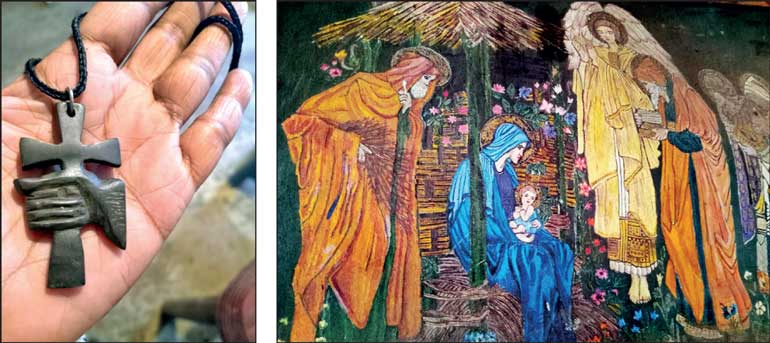
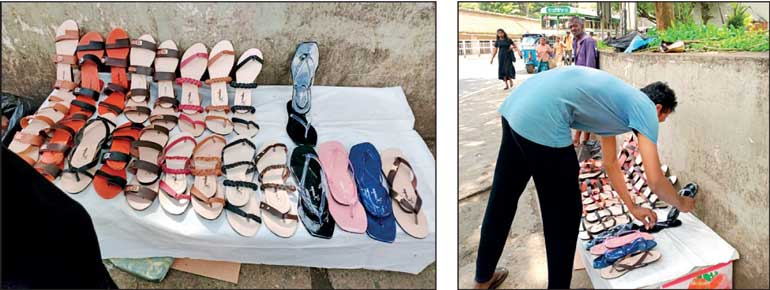
Thus these below narratives are the stories of a few Sri Lankans in diverse areas of this beautiful country rich in every way and made poor only through the diabolical actions of a few.
Meet Nalin Chandana, handicraft and recycle specialist of Nuwara Eliya
A maverick of everything that is artistic, there seems to be nothing that he cannot create and re-create. For over four decades, for as long as he can remember, he has given life to art using every imaginable throw away debris. A piece of rubber consigned for the trash bin becomes an attractive pendant cojoined with a piece of carved coconut shell. Likewise a non-bio-degradable piece of plastic becomes a glorious miniature angel on a string to grace the neck of some damsel and dozens of coconut shells are turned into intricately crafted symbols of faith or denoting other diverse meaning. Throwaway wooden pieces are used as well; for example to be crafted as crosses or moons or stars.
There is a tiny ebony clenched fist pendant (Nalin informs that it is the symbol of freedom). He is also an artist painting on canvass. What I see is a Christian oriented work that was done many years go and depicting an angel and Mary, mother of Jesus. He is also a wizard of ironwork – there are massive installations done that depict cycling and cyclists, fashioned in iron. He is also a veteran using Cadjan for constructing sustainable housing and sitting in a hotel that he has designed in Nuwara Eliya, I revel in the village based artistry all of us seem to have forgotten. On a rainy day, inside this edifice that he has crafted I am warm as toast. While I have just left a cement made house with a leaking ceiling here it is firmly secured from the elements.
Below is his talent that this country has been blind to, in his own voice.
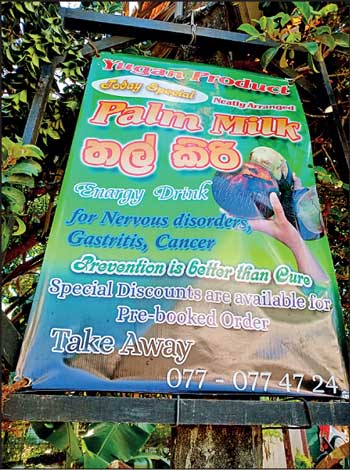 “I can craft anything. I can recycle anything. I can paint anything. I can construct anything. I have sold thousands of coconut, wooden and plastic made recycled artefacts I created. I have once sold for 100 USD a small guitar from a small piece of wood that took me a week to carve. I do not undervalue my work. An artist should have self respect for what he does. See this cross with a praying hand. For Sri Lankans I will sell this for Rs. 5,000 minimum. We need honour and respect to be brought to the artist. We are not beggars. It is true that we sell on the pavement. I am from Nuwara Eliya but I have sold on almost every pavement in almost every district of Sri Lanka. It is only Jaffna I have not been to so far. Hikkaduwa, Galle, Matara, Colombo, Kandy. I have sold on the streets of all these locations. In another country perhaps I could have become a millionaire and be recognised for the artist that I am. Here in this country I just get by day to day, managing to stay above debt.”
“I can craft anything. I can recycle anything. I can paint anything. I can construct anything. I have sold thousands of coconut, wooden and plastic made recycled artefacts I created. I have once sold for 100 USD a small guitar from a small piece of wood that took me a week to carve. I do not undervalue my work. An artist should have self respect for what he does. See this cross with a praying hand. For Sri Lankans I will sell this for Rs. 5,000 minimum. We need honour and respect to be brought to the artist. We are not beggars. It is true that we sell on the pavement. I am from Nuwara Eliya but I have sold on almost every pavement in almost every district of Sri Lanka. It is only Jaffna I have not been to so far. Hikkaduwa, Galle, Matara, Colombo, Kandy. I have sold on the streets of all these locations. In another country perhaps I could have become a millionaire and be recognised for the artist that I am. Here in this country I just get by day to day, managing to stay above debt.”
What does he expect from an honestly working Government caring for the people?
“Please see us. Hear us. Come and talk to us. Try to provide people like us some assistance to give employment to others. For example if I can set up small factories across Sri Lanka I can train disabled soldiers. I can even train blind people to carve. It is not impossible. Nothing is impossible with human will. All I need is to test a person’s flexibility and firmness of wrist – I usually do this by testing if they can thread a needle. This is all that is needed. If they can thread a needle without the wrist shaking then they can be trained to be an artist and to carve. We talk of this country having large numbers of unemployed people. This is because we are not training people to do things. Please recognise that this country is full of people like me. Look around you. Then take action to just help us in a minor way – that is enough – then we will help others. This is why we need a Government.”
Nalin can be contacted on 0772026541
Walanda
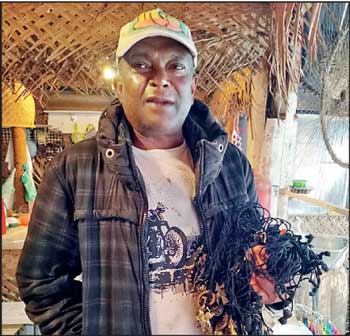 |
| Nalin Chandana and some of his creations |
Now we step into ‘Walanda’ the Cadjan made restaurant – the brainchild of Nalin who had constructed it with Cadjan. It also showcases some of his iron made artworks.
On a misty morning when the skies seem to have clouded up most of the world and one desperately needs a huddle up with a warm cup of coffee or tea preferably with a breakfast of kade paan and parippu – this is your one stop solution in Nuwara Eliya, just a few minutes away from the town. The heat of the hearth welcomes you and the wisps of the golden fire is visible beckoningly from the road.
Upon entering one meets two hardworking women; Sanda Patabendige and Thushari Priyadarshani who briskly get about cooking and serving – hot rice with vegetables, rolls, samosa, roti and bread which you can have with dhal and sambol alongside ginger tea and coffee.
I enter and spend the next two hours metamorphosing into a glutton. The bread, the roti, the rice. I eat it all. I am amazed at my appetite. The coffee I drink. The tea I drink. This feast would make it impossible for me to consume anything for possibly another 48 hours and it cost me less than Rs. 1,000.
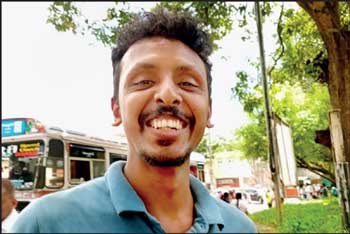 |
| Muhammed Raza the shoe wear magician from Kandy |
This is what Sanda and Thushari who have embarked on this entrepreneurial venture two months ago would like an authentic people’s government to do.
“Please if possible feature businesses such as ours in tourist oriented leaflets or publications. We are humble entrepreneurs but we function 100% hygienically and any PHI could inspect and attest to this. We have local customers but if we are promoted amongst tourists then we will have more business.”
Walanda is situated less than 1 kilometre from the Nuwara Eliya town enroute to the Laughing Leopard international hostel and the Gayathri temple.
Mohammed Raza, epitome of a typical hardworking Sri Lankan youth
We now travel to Kandy to the pavement near the Kandy-Colombo CTB bus stand were we meet Mohammed Raza. He is the epitome of a typical hardworking Sri Lankan youth with an over-abundance of talent. In his case it is footwear. Slippers, boots, walking shoes. He makes them all. He sells on a small strip of space on the busy Kandy pavement alongside other entrepreneurs. These Sri Lankans do not have fancy entrepreneurial or business management degrees but they know how to sell. I hear such attractive slogans being shouted that I turn and tell one seller that surely he can sell his grandmother as a bride. He seems irked and replies that he don’t sell women, only things. I hasten to explain that I was just joking and meant it as a compliment.
Meanwhile Raza has sold three pairs of ladies sandals in less than 20 minutes. Constantly re-arranging and announcing what he has for sale he attracts several ladies.
“See madam, it looks so nice on you. Try this colour. This suits better. It is only Rs. 1,000.”
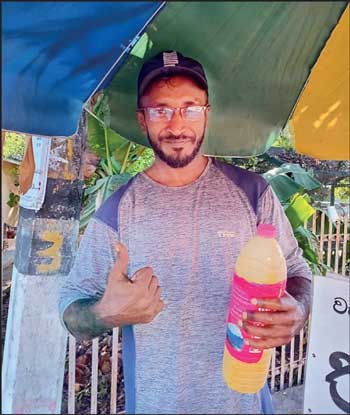 |
| Yugantha Sampath from Colombo researcher of health drinks |
The woman in question buys two pairs.
I wait till he is free of customers and I discuss the possibility of embarking on some specialised creations. We have an interesting discussion and I promise to return. He assures me of his shoe making skill.
“Madam, I can make any kind of shoe. Those shoes you see in Europe that all our posh ladies buy for about Rs. 25,000 – I can make them for half that price. I can make school wearing shoes for our village children who go barefoot. I can make special shoes for our farmers. I can make shoes with herbs for those recovering from certain illnesses. I can make high heels for ladies to wear for parties. I can make men’s shoes. There is no shoe, madam that I cannot make. Please take my voice and other voices like mine to the world. We can make this country rich. We can retain dollars in this country. We are not a poor country madam. We are a rich country. If people like us are given a chance we are a rich country.”
Raza can be contacted on 071 5199929.
Yugantha Sampath Jayawardena, practice-based researcher in nutrition-based drinks
We now come to the roadside in a suburb of Colombo between Nugegoda and Maharagama –within the vicinity of Udahamulla.
Lets meet Yugantha Sampath Jayawardena. He is a practice-based researcher in nutrition-based drinks. He had earlier experimented with leaf based broth (kendha) studying what is not usually available in the market. Now he has embarked on Palmyrah juice. He produces for optimised health and provides it for customers who can drink it ‘on the go.’ I meet him around 8 a.m. Many rush past his mobile drink stall but some do stop. His full time job is as a security official at the Agrarian Department in Kotte. He has several certifications including a diploma from ICBT campus, has reached civil engineering certificate level from Technical College in Ratmalana and following several other courses.
He had appealed for me not to write about his certificates stating that he has gone about acquiring these solely for his love of knowledge and that he does not wish it to be exhibited. I have gone against his request. This is to prove how true ‘education’ is opposite to the malady of being permanently head damaged in yearning for three letters that can conceal immense stupidity - if not obtained with the humility and comprehension that an abbreviation of any sort announcing a ‘qualification’ is only a beginning and not the end, to the long road to knowledge.
This is Yugantha’s narration in his own words.
“The Palmyra tree is a majestic and mysterious tree. I think a lot about things. For example I think how much we have taken for granted the nature all around us. Most of our population is sick with cancer and diabetes. But does it have to be this way when we are surrounded with such miracle cures through food such as coconut, palmyra and countless other vegetation? I researched many such fruits and vegetables and I decided to market palmyra juice which I am trying to produce in larger qualities. Palmyra is perfect for preventing nervous disorders, gastritis and cancer. It is also very heavy on the system and is as filling almost as food. I want to produce it in a beer can type of way that is attractive to the eye and can last longer. I am currently researching how I can do this without using artificial preservatives. This is a bit of a challenge but I think it can be done.”
Let us listen now to how he goes about this business and how many others get financial benefit through it, even in a small way.
“For this business, the key timing is between August and October which is when the Palmyra tree bear fruit. Palmyra grows in several locations in Sri Lanka including North. I collect these from diverse locations. I pay Rs. 2,000 to one person for collecting the fruits. The fruits drop when ripe. We just have to identify the trees and gather them. At the moment several unemployed youth earn up to about 20,000 each with what I pay them. There are thousand of others like me. We are not a country of lazy people. We are merely overlooked. Help us to help other Sri Lankans. Help us to restore our country to a dignified manner. We are honest and we are hardworking. This Palmyra juice producing process takes me about five hours and I hasten to sell it fresh as it does not have very long shelf life. I am concurrently researching several other juice products but that cannot be revealed for the moment.”
This entrepreneur can be reached on 0770774724.